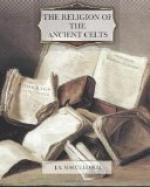Thus the primitive nature-spirits gave place to greater or lesser gods, each with his separate department and functions. Though growing civilisation tended to separate them from the soil, they never quite lost touch with it. In return for man’s worship and sacrifices, they gave life and increase, victory, strength, and skill. But these sacrifices, had been and still often were rites in which the representative of a god was slain. Some divinities were worshipped over a wide area, most were gods of local groups, and there were spirits of every place, hill, wood, and stream. Magic rites mingled with the cult, but both were guided by an organised priesthood. And as the Celts believed in unseen gods, so they believed in an unseen region whither they passed after death.
Our knowledge of the higher side of Celtic religion is practically a blank, since no description of the inner spiritual life has come down to us. How far the Celts cultivated religion in our sense of the term, or had glimpses of Monotheism, or were troubled by a deep sense of sin, is unknown. But a people whose spiritual influence has later been so great, must have had glimpses of these things. Some of them must have known the thirst of the soul for God, or sought a higher ethical standard than that of their time. The enthusiastic reception of Christianity, the devotion of the early Celtic saints, and the character of the old Celtic church, all suggest this.
The relation of the Celtic church to paganism was mainly intolerant, though not wholly so. It often adopted the less harmful customs of the past, merging pagan festivals in its own, founding churches on the sites of the old cult, dedicating sacred wells to a saint. A saint would visit the tomb of a pagan to hear an old epic rehearsed, or would call up pagan heroes from hell and give them a place in paradise. Other saints recall dead heroes from the Land of the Blessed, and learn the nature of that wonderland and the heroic deeds
“Of the old days, which seem to
be
Much older than any history
That is written in any book.”
Reading such narratives, we gain a lesson in the fine spirit of Christian tolerance and Christian sympathy.
FOOTNOTES:
[2] Some writers saw in the bardic poetry a Druidic-esoteric system and traces of a cult practised secretly by the bards—the “Neo-Druidic heresy”; see Davies, Myth. of the Brit. Druids, 1809; Herbert, The Neo-Druidic Heresy, 1838. Several French writers saw in “Druidism” a monotheistic faith, veiled under polytheism.
[3] Livy, v. 46; Caesar, vi. 16; Dion. Hal. vii. 70; Arrian, Cyneg. xxxv. 1.
[4] Caesar, vi. 15, cf. v. 12, “having waged war, remained there and cultivated the lands.”
[5] Cf. Pliny, HN xvii. 7, xviii. 18 on the wheeled ploughs and agricultural methods of Gauls and Britons. Cf. also Strabo, iv. 1. 2, iv. 5. 5; Girald. Camb. Top. Hib. i. 4, Descr. Camb. i. 8; Joyce, SH ii. 264.




